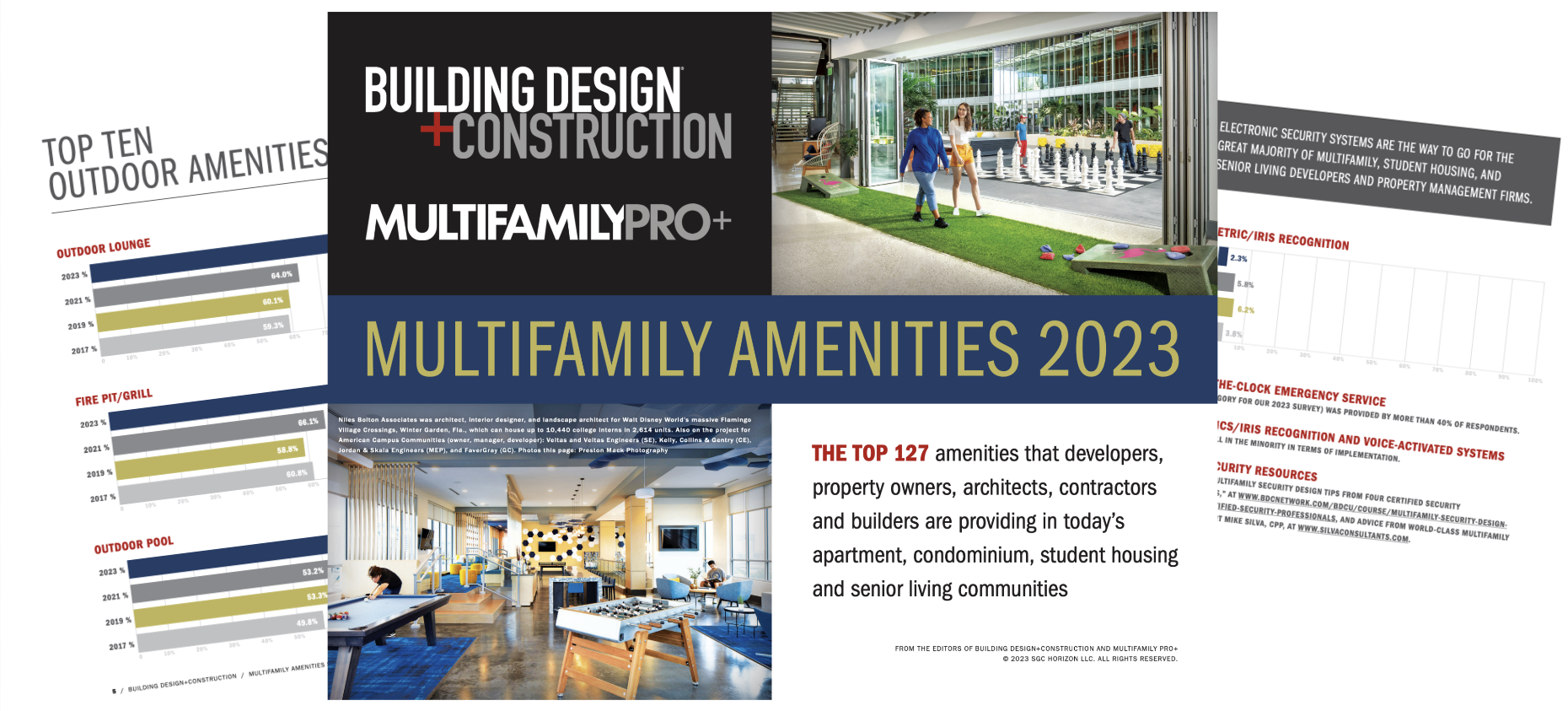In the summer of 2023, the editors of Building Design+Construction and Multifamily Pro+ surveyed more than 140 multifamily design, construction, and development experts to get a sense of the top amenities that project teams are providing in today’s apartment, condominium, student housing, and senior living communities. The following report (available for free download below) outlines 127 top amenities in multifamily housing projects.
Key findings of the 2023 Multifamily Amenities report:
- Multifamily developers and their AEC teams are innovating when it comes to providing desirable amenities to tenants in apartments, condominium clients, students in academic housing, and seniors in senior living communities. They have responded to many of the difficulties posed by the Covid pandemic with fresh ideas and bold approaches.
- After site location and rental/purchase cost, offering the right mix of amenities remains the key selling point for new and renovated multifamily housing, whether rental apartments, condominiums, student housing, or senior living communities.
- New options, such as interactive fitness services and dog exercise stations, are coming online all the time, adding to the complexity of making the right choices as to the best mix of amenities to provide.
The full report offers a breakdown of the top amenities across these categories:
- Top 10 outdoor amenities
- Top 10 indoor amenities
- Top 10 recreation amenities
- Top 10 convenience amenities
- Top 10 quality of life amenities
- Top 10 children's services
- Top 10 services for pets
- Top 10 technology services
- Top 10 security services
How developers and their AEC firms are innovating when it comes to multifamily amenities
We asked respondents to let us know what multifamily amenities innovations or fresh concepts they had tried in recent projects. Here’s a rundown of some of the more intriguing responses.
EV charging stations, solar power, smart appliances, and maker spaces were the choices of several respondents. “We are moving toward all-electric buildings throughout our
14-state portfolio,” said one developer.
“Larger, nicer co-working spaces” garnered support from one respondent. But another said their firm was nixing communal co-working spaces in favor of designing work-from-home spaces right in the apartments.
HOT DESKS, ROCKY WALLS, WET BARS
One respondent said their firm was designing co-working spaces that included “hot desks,” small day offices, multiple conferences rooms, a wet bar, and phone booths for private calls. This developer predicted that “this feature will soon approach the preference rating for fitness centers” among work-from-home residents and self-employed individuals.
Active leisure amenities advanced. One respondent was installing rock walls in its communities. Another had opened its fitness centers for 24/7 access. Yet another added exercise stations to their walking trail.
Several said dedicated pickleball courts were becoming de rigueur in their communities. (To build them right, see “Pickleball, anyone?” at: bdcnetwork.com/pickleballanyone) One developer had provided “private fitness pods” for smaller groups. Another had put in “beer walls”; that’s “active leisure,” isn’t it?
LEARNING THE NEEDS OF DISABLED RESIDENTS
Residents with accessibility concerns benefited from one developer: “We’ve been meeting with disabled residents to learn more about their daily needs,” said this respondent, who was going “above and beyond code” with accessible design.
One respondent had implemented automated parking, another “intelligent” parking. Yet another was offering individual detached garages to tenants.
“Interactive smart kiosks” were on one respondent’s innovations list. Yet another was using an online property maintenance platform.
Entertainment venues were a hit with some. One team installed a roof deck with gazebo. Another was putting in private dining areas.
Amenities for the arts also got some love. One respondent had built a green room for residents to record video shorts. Another put a “book share box” near the mailboxes. Music rooms were the choice of some project teams.
ENVIRONMENTAL, PERSONAL COMFORT CONCERNS
The use of sustainable materials (though not enumerated) scored with one respondent. Another said, “Mass timber is making a play in the market.” “Environmental cleaning” (not defined) was the choice of one firm. Yet another had installed a system to recycle rainwater to be used in the cooling tower for ventilation purposes.
Creature comforts were important to some respondents. One firm added drinking water fountains to its senior living homes. An apartment designer broadened their balconies to six feet in width instead of four feet. A developer in Honolulu offered “multiple furniture options” in its downtown high-rise. To “stay competitive with adjacent properties” one developer upgraded unit finishes and lighting.
“Grab-and-go convenience stores” within the amenity space—not vending machines!—were being put in place by one firm.
In terms of security innovations, respondents reported installing electronic unit deadbolts. One developer was installing ring cam security cameras in every unit. Yet another had installed a keyless entry system in an assisted living facility.
GET THE DESIGN RIGHT, FROM THE START
One consultant to multifamily developers and AEC teams issued this warning: “Floor plan designs and unit features are more important than amenities in the leasing decision! Great amenities will not overcome a poor to average unit design.”
Another consultant advocated for creating “a community feel”—rather than “just a place to live”—and recommended that multifamily developers and AEC teams move television screens, games, and billiards under the club room porch––outside, but protected from the weather. “Many clubhouses close around 6:00 when most renters are returning from work, so this can serve as an outdoor gathering area.”
The final word from this respondent: “Design the structure to be as efficient as possible first, then make the unit and amenity layouts fit around it.”
Related Stories
Resiliency | Jun 3, 2024
Houston’s buyout program has prevented flood damage but many more homes at risk
Recent flooding in Houston has increased focus on a 30-year-old program to buy out some of the area’s most vulnerable homes. Storms dropped 23 inches of rain on parts of southeast Texas, leading to thousands of homes being flooded in low-lying neighborhoods around Houston.
Affordable Housing | May 30, 2024
General contractor’s keys to a successful affordable housing project
General contractors can have tremendous influence over a project’s success in terms of schedule, budget, and quality. However, to ensure a project is put on this path, there are a few factors that must be considered.
MFPRO+ New Projects | May 29, 2024
Two San Francisco multifamily high rises install onsite water recycling systems
Two high-rise apartment buildings in San Francisco have installed onsite water recycling systems that will reuse a total of 3.9 million gallons of wastewater annually. The recycled water will be used for toilet flushing, cooling towers, and landscape irrigation to significantly reduce water usage in both buildings.
MFPRO+ News | May 28, 2024
ENERGY STAR NextGen Certification for New Homes and Apartments launched
The U.S. Environmental Protection Agency recently launched ENERGY STAR NextGen Certified Homes and Apartments, a voluntary certification program for new residential buildings. The program will increase national energy and emissions savings by accelerating the building industry’s adoption of advanced, energy-efficient technologies, according to an EPA news release.
Student Housing | May 28, 2024
Student housing remains strong in May 2024
Although the pace has slowed down this year, student housing preleasing for the 2024–2025 season reached 73.5% in April, 50 basis points year-over-year (YOY).
MFPRO+ News | May 24, 2024
Austin, Texas, outlaws windowless bedrooms
Austin, Texas will no longer allow developers to build windowless bedrooms. For at least two decades, the city had permitted developers to build thousands of windowless bedrooms.
Mass Timber | May 22, 2024
3 mass timber architecture innovations
As mass timber construction evolves from the first decade of projects, we're finding an increasing variety of mass timber solutions. Here are three primary examples.
Mixed-Use | May 22, 2024
Multifamily properties above ground-floor grocers continue to see positive rental premiums
Optimizing land usage is becoming an even bigger priority for developers. In some city centers, many large grocery stores sprawl across valuable land.
MFPRO+ News | May 21, 2024
Massachusetts governor launches advocacy group to push for more housing
Massachusetts’ Gov. Maura Healey and Lt. Gov. Kim Driscoll have taken the unusual step of setting up a nonprofit to advocate for pro-housing efforts at the local level. One Commonwealth Inc., will work to provide political and financial support for local housing initiatives, a key pillar of the governor’s agenda.
MFPRO+ News | May 21, 2024
Baker Barrios Architects announces new leadership roles for multifamily, healthcare design
Baker Barrios Architects announced two new additions to its leadership: Chris Powers, RA, AIA, NCARB, EDAC, as Associate Principal and Director (Healthcare); and Mark Kluemper, AIA, NCARB, as Associate Principal and Technical Director (Multifamily).


















